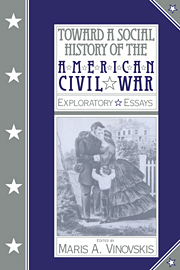Book contents
- Frontmatter
- Contents
- Introduction by Marts A. Vinovskis
- 1 Have Social Historians Lost the Civil War? Some Preliminary Demographic Speculations
- 2 Community and War: The Civil War Experience of Two New Hampshire Towns
- 3 The Northern Soldier and His Community
- 4 Voluntarism in Wartime: Philadelphia's Great Central Fair
- 5 The Civil War and Municipal Government in Chicago
- 6 Who Joined the Grand Army? Three Case Studies in the Construction of Union Veteranhood, 1866–1900
- 7 “Such Is the Price We Pay”: American Widows and the Civil War Pension System
- Index
6 - Who Joined the Grand Army? Three Case Studies in the Construction of Union Veteranhood, 1866–1900
Published online by Cambridge University Press: 03 February 2010
- Frontmatter
- Contents
- Introduction by Marts A. Vinovskis
- 1 Have Social Historians Lost the Civil War? Some Preliminary Demographic Speculations
- 2 Community and War: The Civil War Experience of Two New Hampshire Towns
- 3 The Northern Soldier and His Community
- 4 Voluntarism in Wartime: Philadelphia's Great Central Fair
- 5 The Civil War and Municipal Government in Chicago
- 6 Who Joined the Grand Army? Three Case Studies in the Construction of Union Veteranhood, 1866–1900
- 7 “Such Is the Price We Pay”: American Widows and the Civil War Pension System
- Index
Summary
For the 2 million veterans of the Union army, the final muster-out in 1865 was a mixed blessing. Obviously these men were happy to be ending what were often long and dangerous periods of service; a few were glad to have lived through short terms of service to collect large bounties. Many more were relieved just to have escaped serious injury. But in “civilian” society, as they now called it, the veterans also would face job competition from men with several years' head start and, in many cases, they had to deal with the additional handicap of wounds or chronic illness. Even more important, they would need to shed their alien wartime world in which the values of “civilian” society had been stood on end: Violence had been justified, social distinctions leveled, individual preference submerged in discipline and order, death a daily occurrence. To noncombatants, the veterans pouring off the trains in the summer of 1865 were familiar, yet remained strangers. “They are, 'tis true, stern looking men, and pass along our streets, with a gloomy melancholy,” remarked one country editor in Eau Claire, Wisconsin, “claiming no immunity, asking no applause, and seemingly unconscious of the great service they have rendered.”
In these respects, the former Union soldiers differed little from veterans of other American wars. Postwar unemployment has always been a problem (though one could argue that the industrializing economy of the midnineteenth century made it worse); by 1865, providing pensions for ill and wounded veterans was already a matter of long-standing public policy.
- Type
- Chapter
- Information
- Toward a Social History of the American Civil WarExploratory Essays, pp. 139 - 170Publisher: Cambridge University PressPrint publication year: 1990



